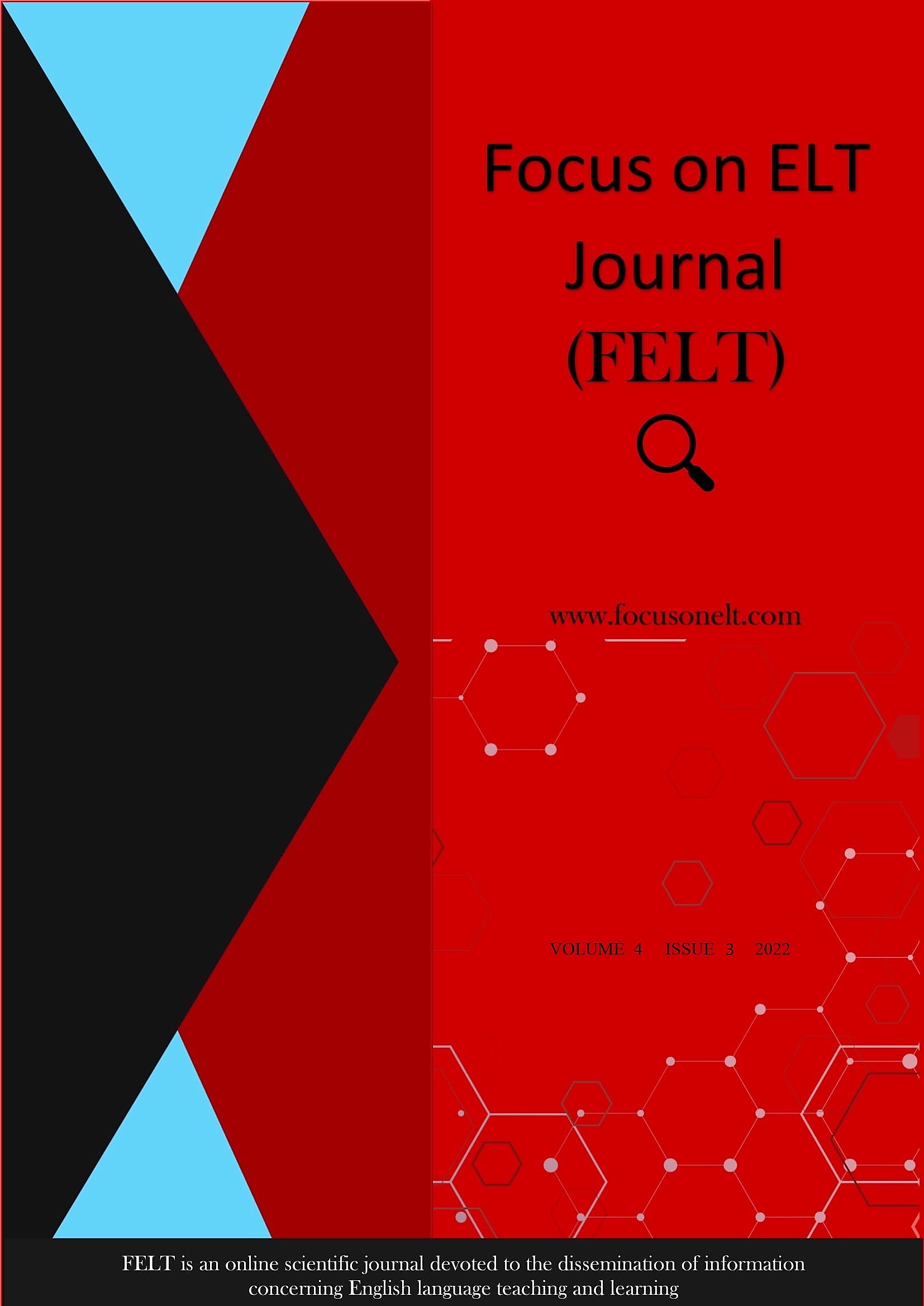High-school English teachers’ attitudes towards using authentic materials and non-authentic materials in English lessons in Türkiye
Main Article Content
Abstract
This mixed-method design study examines high-school English teachers' attitudes toward using authentic and non-authentic materials in Türkiye. It thoroughly investigates teachers' instructional material uses and the underlying reasons for using certain materials in their teaching practices. The study comprised forty Anatolian high-school English language teachers from five schools in five districts of Kayseri. Data gathered from a questionnaire and semi-structured interviews revealed that high-school English language teachers in Türkiye had positive attitudes toward using authentic materials (materials used by native speakers in their daily life). In contrast, they had negative attitudes toward using non-authentic materials (current official textbooks). It was also pointed out that despite their negative attitudes toward these materials, teachers used official textbooks more frequently than authentic materials. The primary underlying reason for this discrepancy was explained as the relevance of these materials to the curriculum and the lack of time to adapt authentic materials. Teachers also reported that they could not use authentic materials as frequently as they wished even though these materials were appropriate for their students' needs with their engaging, communicative, and flexible content. This study's results are expected to contribute to the future development of the curriculum and teaching materials, considering teachers' attitudes in Türkiye.
Metrics
Article Details

This work is licensed under a Creative Commons Attribution-NonCommercial-NoDerivatives 4.0 International License.
References
Alhamami, M., & Ahmad, J. (2018). EFL teachers’ attitudes toward commercial textbooks in EFL programs. SSRN Electronic Journal, 9(4). 69-87. https://doi.org/10.2139/ssrn.3308249
Allag, B. (2017). Investigating EFL students' and teachers' attitudes towards the use of authentic materials in EFL in listening classrooms [MA dissertation, University of Larbi-Ben M’hidi]. Investigating EFL students' and teachers' attitudes towards the use of authentic materials in EFL in listening classrooms
http://bib.univ-oeb.dz:8080/jspui/bitstream/123456789/3837/1/M%C3%A9moire%20Final.pdf
Al-Musallam, E. I. (2009). College instructors’ and learners’ attitudes to authentic EFL reading materials in Saudi Arabia. [MA dissertation, University of King Saudi]. https://awej.org/images/Theseanddissertation/EnasAlMusallam/enasfullthesis.pdf
Anggis, H., & Setyadi, R. (2016). The use of authentic materials in speaking class for the second-semester students of the English education study program of teacher training and Education faculty of Bandar Lambung University. The proceeding of 4th ICEL conference, 222-228. http://artikel.ubl.ac.id/index.php/icel/article/view/525
Braun, V., & Clarke, V. (2006). Using thematic analysis in psychology. Qualitative Research in Psychology, 3(2), 77–101. https://doi.org/10.1191/1478088706qp063oa
Bryman, A., & Cramen, D. (2011). Quantitative data analysis with IBM SPSS 17,18 &19: A guide for social science (1st ed.). Routledge.
Castleberry, A., & Nolen, A. (2018). Thematic analysis of qualitative research data: Is it as easy as it sounds? Currents in Pharmacy Teaching and Learning, 10(6), 807–815. https://doi.org/10.1016/j.cptl.2018.03.019
Çelebi, D. (2006). Türkiye’de anadil egitimi ve yabancı dil öğretimi: The mother tongue and foreign language education in Turkey. Erciyes Üniversitesi Sosyal Bilimler Enstitüsü Dergisi, 21(2), 285–307. https://dergipark.org.tr/tr/download/article-file/219375
Clarke, V., & Braun, V. (2017). Thematic analysis. The Journal of Positive Psychology, 12(3), 297–298. https://doi.org/10.1080/17439760.2016.1262613
Creswell, J. W., & Plano Clark, V. L. (2011). Designing and conducting mixed method research (2nd ed.). Sage.
Doğan, S. (2022). El dilema de los libros de texto distribuidos de forma gratuita y los libros de texto complementarios que están prohibidos en Turquía. Apuntes Universitarios, 12(3), 58–75. https://doi.org/10.17162/au.v12i3.1103
Erlina, Hamid. (2018). Using authentic online materials for speaking class: A study of students’ perceptions about the teaching and learning of English as a foreign language. Proceedings of the First Indonesian Communication Forum of Teacher Training and Education Faculty Leaders International Conference on Education 2017 (ICE 2017), 407-410. https://doi.org/10.2991/ice-17.2018.86
Hartatik, S. F., & Rahmah, T. H. (2016). Investigating the students’ views on the authentic materials used in basic speaking class. Indonesian Journal of English Language Teaching and Applied Linguistics, 1(1), 1-10. https://doi.org/10.21093/ijeltal.v1i1.4
Islam, T. (2015). A comparative study on the use of Authentic and non-authentic material for language classrooms at the tertiary level [Bachelor dissertation, University of BRAC]. https://core.ac.uk/download/pdf/61807585.pdf
Kılıçkaya, F. (2004). Authentic materials and cultural content in EFL classrooms. The Internet TESL Journal, 10(7), 1–6. http://iteslj.org/Techniques/Kilickaya-AutenticMaterial.html
Krashen, S. D. (2009). Principles and practice in second language acquisition (1st ed.). Sage.
Kumar, R. (2015). Research methodology: A step-by-step guide for beginners (4th ed.). Sage.
Miles, M. B., & Huberman, A. M. (1994). An expanded sourcebook: Qualitative data analysis (2nd ed.). Sage.
Özen, E. N., Bilgiç Alpaslan, I., Çağlı, A., Özdoğan, İ., Sancak, M., Dizman, A. O., & Sökmen, A. (2013). Turkish national needs assessment of state school English language teaching (Report No. 74).TEPAV.
https://www.tepav.org.tr/upload/files/1399388356- 5.Türkiye_National_Needs_Assessment_of_State_School_English_Language_Teaching.pdf
Öztürk, G., & Aydin, B. (2019). English language teacher education in Türkiye: Why do we fail and what policy reforms are needed? Anadolu Journal of Educational Sciences International, 9(1), 181–213. https://doi.org/10.18039/ajesi.520842
Rashidi, N., & Safari, F. (2011). A model for EFL materials development within the framework of critical pedagogy. English Language Teaching, 4(2), 250-259. https://doi.org/10.5539/elt.v4n2p250
Richards, J. C. (2001). Curriculum development in language teaching (1st ed.). Cambridge University Press.
Rusmawaty, D., Atmowardoyo, H., Hamra, A., & Noni, N. (2018). Teachers’ beliefs of authentic materials for teaching reading in Indonesian EFL classrooms. Journal of Language Teaching and Research, 9(3), 608-613. https://doi.org/10.17507/jltr.0903.21
Shi, J. (2015). Criteria for teaching / learning resource selection: Facilitating teachers of Chinese to work with English-speaking learners. [Ph.D. dissertation, The University of Western Sydney ]. https://researchdirect.westernsydney.edu.au/islandora/object/uws:32138
Silvani, N. (2018). English teachers' perception towards the use of authentic materials in teaching English at school [MA dissertation, University of Ar-Raniry state Islamic]. https://repository.ar-raniry.ac.id/id/eprint/2973/1/NELLA%20SILVANI.pdf
Srakang, L. (2013). A study of teachers’ perceptions toward using English Textbooks: A case study of 10th grade English teachers in Maha Sarakham Province [MA dissertation, University of Srinakharinwirot]. https://ir.swu.ac.th/jspui/bitstream/123456789/4111/2/Ladaporn_S.pdf
Tomlinson, B. (2008). English language learning materials: A critical review (1st ed.). Continuum International Publication Group.
Tomlinson, B. (2010). Principles and procedures for self-access materials. Studies in Self-Access Learning Journal, 1(2), 72–86. https://doi.org/10.37237/010202
Tomlinson, B., & Masuhara, H. (2013). Adult coursebooks. ELT Journal, 67(2), 233–249. https://doi.org/10.1093/elt/cct007
Vanha, L. (2007). Teachers’ perspectives on the role of textbooks in English language learning and teaching in Finland [MA dissertation, The University of Oulu].

